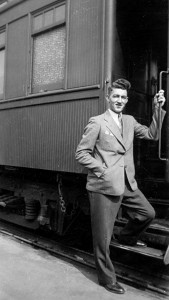Colleagues remember gifted scholar, administrator who exemplified servant-leadership
Immigrant farm boy, hard and confident worker, team builder, family man, devout Christian—Henry Poettcker was all those things and more.
Poettcker, who served as president of Canadian Mennonite Bible College (CMBC), one of Canadian Mennonite University’s (CMU) predecessor institutions, died on Sunday, May 24, following a stroke. He was 90 years old.
![2015-06-04 - Henry Poettcker [01]](http://www.cmu.ca/media_archive/wp-content/uploads/2015/06/2015-06-04-Henry-Poettcker-01-300x199.jpeg)
Waldemar Janzen, Professor Emeritus of Old Testament and German, worked as CMBC’s dean during Poettcker’s presidency. He remembers Poettcker as a calm, steadfast person who steered a steady course for CMBC during the turbulent youth movements of the 1960s and 70s.
“He was a humble, unpretentious leader,” Janzen says.
Harry Huebner, Professor Emeritus of Philosophy and Theology, says Poettcker gave the faculty the freedom to help shape CMBC.
“Perhaps his greatest gift was to interpret the constituency to the faculty and the faculty to the constituency,” Huebner says. “A most sensitive skill.”
Poettcker was born in Rudnerweide, Russia on March 27, 1925. His family moved to St. Elizabeth, Manitoba when he was just a few months old, and then to a farm 25 km. west of Pincher Creek, AB when he was two.
While attending Menno Bible Institute in Didsbury, AB throughout the winter of 1942-43, Poettcker met Aganetha (Agnes) Baergen. After marrying in 1946 in Tofield, AB, they spent eight years in Alberta, Kansas, Illinois, and New Jersey while Poettcker furthered his education.

After CMBC, Poettcker moved to Elkhart, Indiana, where he served as President and Professor of New Testament beginning in 1978 at Mennonite Biblical Seminary, one of the two seminaries that constituted Associated Mennonite Biblical Seminaries, now Anabaptist Mennonite Biblical Seminary.
He was named President Emeritus when he retired in 1990.
Jacob Elias, Professor Emeritus of New Testament who served as dean at AMBS most of the years that Poettcker was president, describes Poettcker as gracious, dedicated, pastoral, organized, warm, and humble.
“His style of leadership was to empower others in their ministries,” Elias says. “He had a keen awareness of the challenges and opportunities facing congregations in Canada and the United States, as well as internationally. He had a deep love for Christ and the church, and a heart for pastors and other church leaders.”
As the first Canadian president of MBS, Poettcker fostered a closer link between the seminaries and CMBC/CMU, says Walter Sawatsky.
Sawatsky, who now is Professor Emeritus of Church History and Mission, remembers Poettcker’s approach to leadership: “Henry’s leadership style modeled a collegial approach that conveyed his style from CMBC and his belief that faculty needed a sense of freedom and were assumed to be part of the seminary leadership.”
In addition to his contributions to CMBC and MBS, Poettcker served as president of the General Conference Mennonite Church (now Mennonite Church Canada and Mennonite Church USA) from 1962 to 1968, wrote Sunday school curricula for adults in German and English, and frequently contributed to Mennonite periodicals.
Upon his retirement in 1990, Poettcker returned to Winnipeg. In 2005, CMU honoured his years of service by naming one of its buildings Poettcker Hall. Four years later, CMU Press published Poettcker’s book, A President’s Journey: The Memoirs of Henry Poettcker.
In his later years, Poettcker gave loving care to Agnes, who suffered a severe and debilitating stroke. She passed away in February 2014.
Poettcker also participated in the professor emeriti group that meets every Thursday morning at CMU for fellowship, professional discussion, and mutual support.
This past March, 10 of Poettcker’s CMBC colleagues gathered with him to celebrate his 90th birthday.
It was a festive hour spent reminiscing over coffee and cake, and honouring the significant role Poettcker played in their lives and careers, and in the history of CMU.
“Henry has been a much greater and more impressive leader than he makes himself out to be,” Waldemar Janzen wrote in the foreword to A President’s Journey.
“He was never an advancement seeker or self-promoter. He did not display his own gifts, but others recognized them and challenged him to prepare for and assume leadership. When that happened, Henry acted with surprise that he should be chosen, and then applied all his energies to the task in order to serve others and God. When I hear the term ‘servant-leader,’ my first thought is of Henry Poettcker.”
A line Poettcker wrote in the resignation letter he sent to CMBC board members in 1977 perhaps best exemplifies his humility and faithfulness in the face of his many contributions to the Mennonite Church:
“If I have been one link in helping along, I give thanks to God.”
Poettcker is survived by daughter Chrystyanna, sons Ron (Carol-Ann) and Martin (Erna), seven grandchildren, 18 great-grandchildren, and extended family.
About CMU
A Christian university in the Anabaptist tradition, CMU’s Shaftesbury campus offers undergraduate degrees in arts, business, humanities, music, sciences, and social sciences, as well as graduate degrees in theology, ministry, peacebuilding and collaborative development, and an MBA. CMU has over about 900 full-time equivalent students, including those enrolled in degree programs at the Shaftesbury and Menno Simons College campuses and in its Outtatown certificate program.
For information about CMU visit www.cmu.ca.
For additional information, please contact:
Kevin Kilbrei, Director of Communications & Marketing
kkilbrei@cmu.ca; 204.487.3300 Ext. 621
Canadian Mennonite University
500 Shaftesbury Blvd., Winnipeg, MB R3P 2N2
